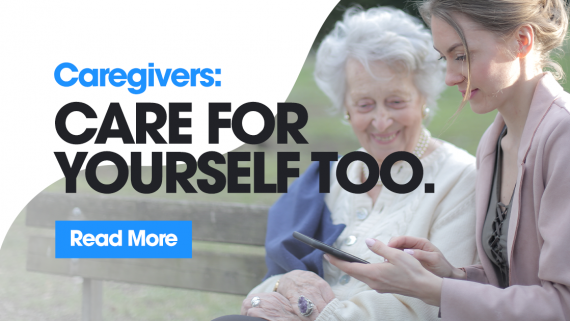Family members are the primary source of support for older adults and people with disabilities in the U.S. Nearly half of all caregivers are over age 50. The significant emotional, physical, and financial toll caregiving can take means that many are vulnerable to their own health declining. In fact, managing mental health as a family caregiver is one of the support services highlighted during National Family Caregivers Month. As we recognize and honor the contributions of caregivers, let’s make sure we take care of them, too.
Engage, Support, and Empower
This year, National Family Caregivers Month builds upon the continued resilience of the care partner community. Over the past year, caregivers have taken on added responsibility to keep themselves and their loved ones safe from COVID-19. With this ever-mounting burden, many may have forgotten to address their own mental and physical well-being.

Alzheimer’s disease is called a family disease because watching a loved one slowly decline creates chronic stress that affects everyone. Nevertheless, it’s important for caregivers to focus on their own needs, take time for their own health, and get support and respite from caregiving regularly to sustain their well-being during this journey. Emotional and practical support, counseling, resource information, and educational programs about Alzheimer’s disease help a caregiver provide the best possible care for a loved one.
You can celebrate National Family Caregivers Month by:
- Taking a free mental health assessment if you are struggling with your own mental health
- Making sure you are taking breaks to rest and enjoy the things you love
- Keeping up with your regular doctor appointments
- Sharing your caregiving story utilizing the hashtags #CaregiverAnd, #FamilyCaregiver, #Caregivers, and #NFCMonth
- Utilizing online and local resources for support
The Vital Role of Caregivers in Dementia Research
Caregivers provide many vital roles when it comes to their loved ones. They are often the first to notice changes in symptoms and behaviors, attend doctor’s visits, and are responsible for communicating with other family members. Clinical research studies offer an opportunity for caregivers to help their loved ones leave a lasting legacy that impacts future generations of individuals with Alzheimer’s or other dementia.

ActivMed Practices & Research offers FREE baseline memory screenings and Alzheimer’s disease research studies that are currently enrolling. To learn more about setting up a free screening for you or a loved one or about our enrolling studies, call (978) 655-7155 or visit our website today!
Sources:
https://acl.gov/news-and-events/downloads-and-multimedia/NFCM
https://www.caregiveraction.org/national-family-caregivers-month
https://www.census.gov/newsroom/stories/family-caregivers-month.html
Alzheimer’s is a progressive disease that impairs memory and many other essential mental functions. Although the changes are more subtle at first, eventually those diagnosed will need the help of a caregiver to perform their daily tasks. In many cases, the caregiver is a loved one or family member that volunteers to support them. Being a caregiver can be physically, emotionally, and mentally draining. Learning to care for yourself is the best way to ensure you will be there to care for your loved one.
From Care Partner to Caregiver and Burnout
In the early stages of Alzheimer’s, many function independently, and your role is more of a care partner who will help support and plan for the future of your loved one. As the disease progresses, their reliance on you will continue to increase until they need you 100%. Navigating the physical and emotional ups and downs of this journey can test even the most patient souls. It can be all-consuming, and just like any fire, it will eventually burn itself out.
Approximately 15 million Americans provide unpaid care to an older adult. Those that provide substantial care are more likely to have physical and emotional health issues. Caregiver burnout is real and can snowball over time. Recognizing the signs of burnout can help you get the help you need to continue providing the best care possible.
Signs of Caregiver Burnout:
- You have much less energy and always exhausted
- Increasingly impatient and irritable with who you are caring for
- Neglectful of your own needs
- You get sick more often
How to be a Healthy Caregiver

One of the most important things you can do as a caregiver is to take care of yourself. Keep your health a priority by seeing your doctor when needed, exercising regularly, and eating a healthy diet. The National Institute on Aging also recommends:
- Ask for help, and take it when you need it
- Take breaks during the day
- Join a support group online or in-person
- Spend time with friends
Research for a Better Future Free of Alzheimer’s
As an Alzheimer’s caregiver, you witness firsthand how this disease changes a person until very few pieces remain of their former selves. Alzheimer’s has no cure, and there is no way to stop the progression of it. Scientists and researchers are hard at work, identifying potential new ways to detect, prevent, manage, and eventually cure it. Clinical research studies and volunteers who participate in them provide a way to determine if they are safe and effective.

If you or a loved one has been diagnosed with Alzheimer’s, research studies may be an option. All Alzheimer’s participants must have a study partner that spends some time with them during the week, to accompany them to some of the study visits. This relationship provides researchers additional insight into the changes that have occurred over time with the patient. Participating in research may provide caregivers another layer of support and education about memory loss.
Caregivers do not need to attend each study visit, sometimes allowing the flexibility to do some shopping or enjoy some alone time. Regular assessments at study visits and conversations with study staff also help caregivers stay informed on their loved one’s health. Caregivers make many decisions with and for their loved ones, consider participating in a research study.
To learn more about the Alzheimer’s studies currently enrolling at our Methuen, MA location, call (978) 655-7155, or click here.
References:
https://www.alz.org/help-support/caregiving
https://www.nia.nih.gov/health/getting-help-alzheimers-caregiving
https://www.helpguide.org/articles/stress/caregiver-stress-and-burnout.htm


